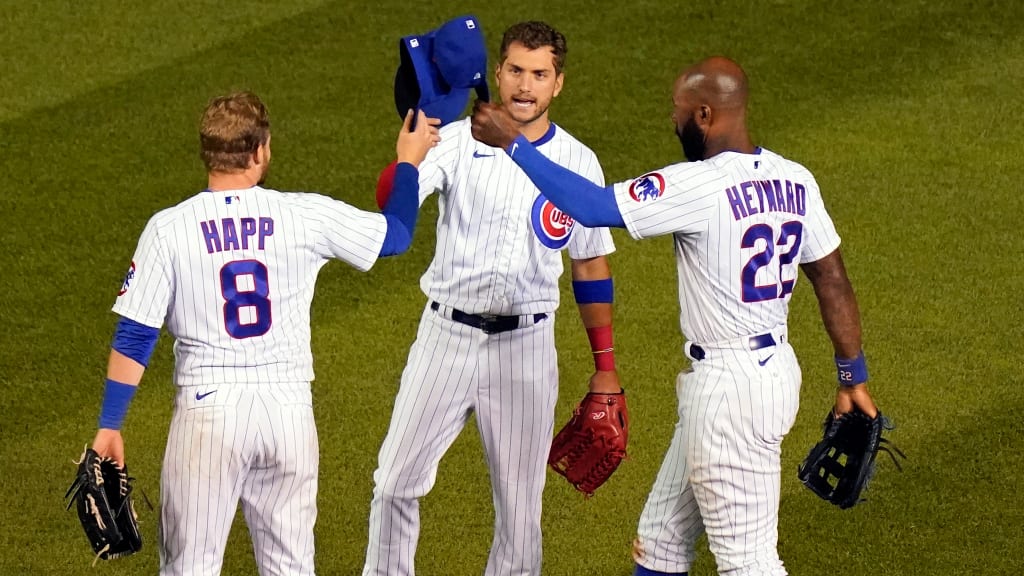
Remember how Cubs president of baseball operations Theo Epstein almost blew up his team’s roster last offseason? Let’s just say he considered all his options.
If he had, look at all the fun Cubs fans might have missed out on. Their team has the National League’s fourth-best record at 26-20 and a three-game lead over the Cardinals in the NL Central.
Center fielder Ian Happ is a probable top three finisher in NL Most Valuable Player voting, and his contributions are especially important for a team that isn’t an offensive powerhouse: 21st of 30 MLB teams in OPS (.724) and runs per game (4.46).
But the Cubs have been alone in first place since the opening week of the season despite their three biggest stars -- Kris Bryant, Javier Báez and Anthony Rizzo -- hitting .208, .196 and .203.
Pitching is what the Cubs do well. Their bullpen has a 1.91 ERA this month, lowest in the Majors, thanks to four late-inning arms -- Duane Underwood Jr., Rowan Wick, Jeremy Jeffress and Jason Adam -- that have combined to allow one run in 20 2/3 September innings.
Even better, a rotation led by Kyle Hendricks and Yu Darvish is capable of powering through October. Or at least getting to an interesting matchup against the Dodgers somewhere down the line.
Now, about blowing up that roster. Epstein was justifiably frustrated about the last two seasons. In 2018, the Cubs let a five-game division lead get away in September and lost both a one-game regular-season playoff to the Brewers and a 13-inning NL Wild Card Game to the Rockies.
When the Cubs missed the playoffs altogether in 2019, Epstein confronted a fork in the road. Maybe his team just wasn’t good enough. Maybe his own roster construction was to blame.
If so, he could fix that. He had control of Bryant, Báez and Rizzo for two more seasons, and their trade value would never be higher than it was at that point.
He either wasn’t blown away by the offers he received, or more likely, believed the Cubs' championship window was still open. Instead, he did the simplest thing he could have done: He changed managers.
Epstein was careful not to blame Joe Maddon, who’d led the 2016 Cubs to the franchise’s first championship in 108 years, for anything that went wrong. But the 2019 Cubs had been 19-27 in one-run games.
One-run games can be viewed largely as luck since they tend to even out year over year. That is, unless it’s your team losing them. When that happens, all the little plays that aren’t made linger in the brain. (This season, the Cubs are 7-7 in one-run games.)
Anyway, Epstein may have thought a new voice and a new approach would be worth a try. So he hired one of his favorite former players, catcher David Ross.
Ross had that rare mix of being a great teammate and a people person, while also being a no-nonsense stickler for details. He preached sweating the small stuff from the first day of Spring Training.
Whether the Cubs are in first place because of Ross is a great closing-time discussion.
“He has stepped in and helped address some things that have been lingering for years,” Epstein said to MLB.com's Jordan Bastian recently.
Translation: Ross was fearless in drawing lines on how the Cubs were expected to perform and separating the things that would be tolerated and those that wouldn’t.
“The guy creates energy all by himself,” Epstein said. “He creates accountability. The players have so much respect for him, that I think they want to do well for him. There’s a sense of not wanting to let him down."
How all of that manifests itself on the field is impossible to quantify. But the Cubs are doing a lot of small things better than they did in 2019, according to Statcast research by Andrew Simon through Friday's games:
Plate patience: 3.87 pitches per plate appearances (22nd out of 30 teams) in 2019 to 4.17 (first).
Hard-hit rate: 36 percent in 2019 (19th) to 40.6 percent in 2020 (tied for fifth). That 4.6-percent increase is the MLB’s third-largest, behind only the Padres (5.5 percent) and the Dodgers (4.9 percent).
Hard-hit rate (continued): Happ, Willson Contreras and David Bote are all in the top 40 thanks to huge improvement from the previous season.
Base running: The Cubs were below average (-2.2) in FanGraphs’ Base running value metric in 2019. This season, they are +1.8 (11th).
Defense: They've improved from 22nd in Defensive Runs Saved in 2019 to seventh in 2020.
“I’ve never given up faith in our guys,” Epstein said. “It’s really about the group as a whole coming together and the environment. And have we been able to create an environment that can bring out the best in players and put them in a position to succeed.”


